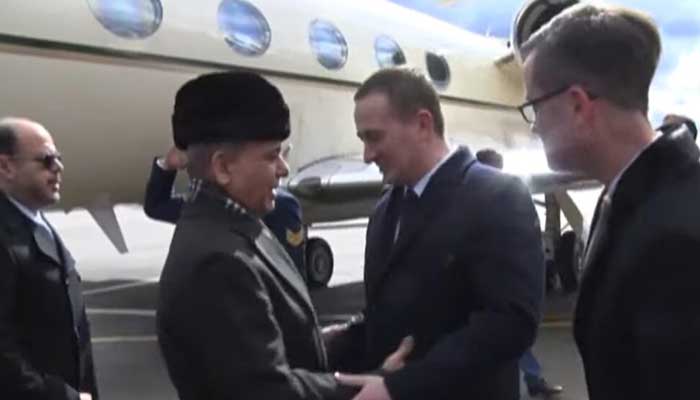PM Shehbaz lands in Minsk for two-day official visit
Premier is accompanied by high-level delegation, including federal ministers and senior officials
ISLAMABAD: Prime Minister Shehbaz Sharif arrived in Minsk on a two-day official visit from April 10 to 11, 2025, on the invitation of Belarusian President Aleksandr Lukashenko.
Belarus Prime Minister Alexander Turchin and officials of Pakistan embassy in Belarus warmly welcomed the prime minister.
PM Shehbaz Sharif was accompanied by a high-level delegation comprising Deputy Prime Minister and Foreign Minister Senator Ishaq Dar, Information and Broadcasting Minister Attaullah Tarar and Special Assistant to PM Tariq Fatemi.
During his visit, the prime minister will hold talks with President Lukashenko to review progress in areas of mutual interest.
The two sides are also expected to sign several agreements to further strengthen cooperation.
Prime Minister Shehbaz Sharif’s visit underscores a strong and ongoing partnership between Pakistan and Belarus.
This visit follows President Lukashenko's important visit to Pakistan in November 2024, during which both nations signed more than a dozen important memoranda of understanding (MoUs) and agreements, with pledges to further expand bilateral cooperation in diverse fields.
Both PM Shehbaz and Lukashenko emphasised the importance of advancing political dialogue and strengthening inter-parliamentary relations.
They also focused on expanding trade and economic cooperation, adopting a collaborative approach to regional economic integration and connectivity and enhancing the legal framework to facilitate bilateral collaboration.
-
Security forces gun down 30 terrorists in multiple IBOs in KP: ISPR
-
MQM-P calls for new province in Sindh
-
US report validates Pakistan military edge over India: PM
-
Banned TTP poses serious threat to Pakistan security: UNSC panel
-
CM Afridi clarifies remarks on by-poll after ECP requests army deployment
-
Dubai sees 3.2m Pakistani passengers in 2025 as airport sets new milestone
-
Security forces kill 23 Indian proxy terrorists in KP's Kurram
-
Pakistan to construct island to boost oil exploration: report












